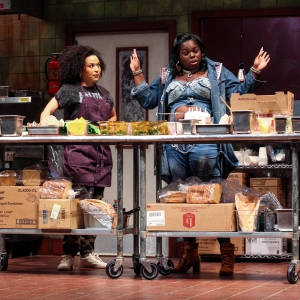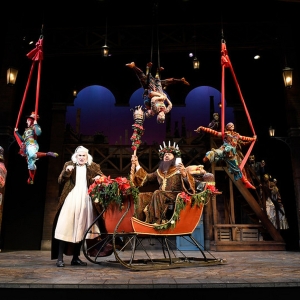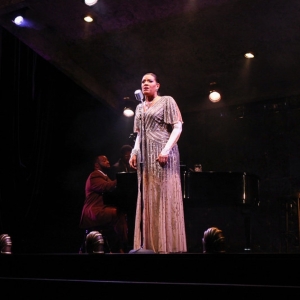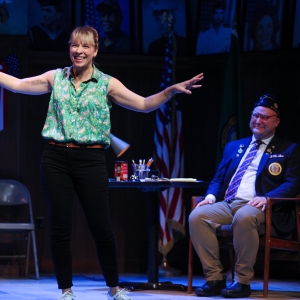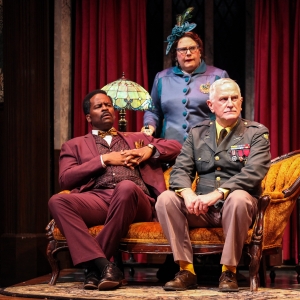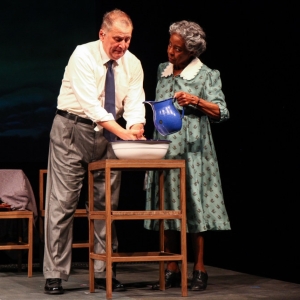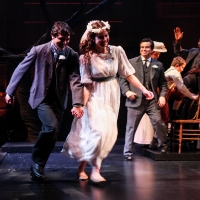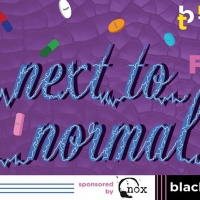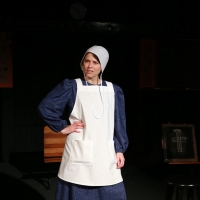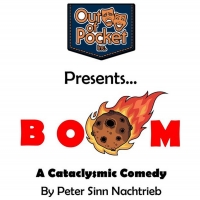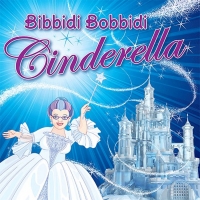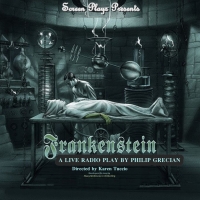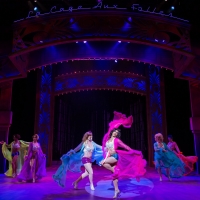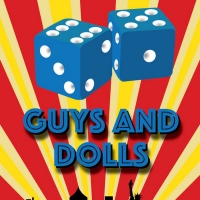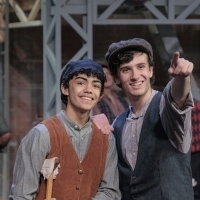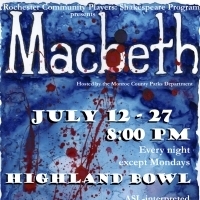Dan and Julie Izzo

Dan and Julie Izzo began their theatrical collaboration at the College of William and Mary where they studied theatre and speech. They were founding members of the Virginia Shakespeare Festival and have acted at various regional theatres on the east coast. Between them they have taught English literature, acting, voice, dance and improvisation. For the past 20 years they have directed and designed numerous productions. Most recently they have collaborated on writing original musicals.
LEARN MORE ABOUT Dan and Julie Izzo
First Show:
Sweeney ToddFavorite Show:
Medea with Zoe CaldwellFavorite Stories:
- Review: CLYDE'S at Syracuse Stage - We love food and we love good theater. This show had both. It also provided us the opportunity to play with food references and puns.
- BWW Review: AS YOU LIKE IT at Shake On The Lake - We stumbled upon this outdoor production as we were out for a walk. What a great surprise! It was spirited and creative! I was told that we were the first people to review this company.
MOST POPULAR ARTICLES
February 5, 2024
If you are hungry for some tasty theater that is fresh, natural and with just enough sizzle to keep you satisfied, get yourself down to Syracuse Stage to see Clyde’s, a thoughtful and inspiring new play by Pulitzer Prize winner, Lynn Nottage. Set in a lonesome truck stop diner somewhere outside of Reading, Pennsylvania, what is on Clyde’s menu is a socially conscious parable, layered with an authentic slice of life and wrapped in a bittersweet quixotic adventure: the search for the perfect sandwich. It all may sound like a strange scenario but as Rafael the fry cook exclaims, “It tastes like the truth!”
December 4, 2023
What did our critic think of A CHRISTMAS CAROL at Syracuse Stage?
October 23, 2023
What did our critic think of LADY DAY AT EMERSON'S BAR AND GRILL at Syracuse Stage? Syracuse Stage follows its one woman tour de force, What the Constitution Means to Me, with Lady Day at Emerson’s Bar and Grill, an equally challenging one woman production that is similarly structured and almost begs to be compared and contrasted with their season opener.
September 18, 2023
Syracuse Stage kicks off its 50th anniversary season with Heidi Schreck’s 'What the Constitution Means to Me', a clever, poignant, multifaceted gem of a play. Literally framed like an old photograph that stirs memory, the play begins as the middle-aged Heidi Schreck (Mel House) steps into a picture of her teenage self engaged in competitive debate.
June 16, 2023
Syracuse Stage closes its 2022-23 season with the madcap farce, Clue. Based on the iconic 1950’s board game of the same name, Clue spoofs whodunit mysteries, film noir, 1950’s pop culture and gothic horror films. The play is adapted for stage from the 1985 film that was a critical flop but has since become a cult classic. Set during McCarthy’s House Un-American Activities Committee hearings, a time fraught with suspicion and accusation, the mansion owned by Mr. Boddy becomes the gathering point for six invited guests. These guests we find out are all guarded about their pasts, are all being blackmailed and are referred to by aliases that correspond to the famous characters in the board game. Each guest is then gifted one of the six murder weapons. In all, there are six potential murderers, six weapons and nine rooms in the mansion, 324 possibilities for who, what and where; as Shakespeare and Sherlock Holmes agree, now “the game is afoot.” The gothic mansion, the dark and stormy night, the suspenseful reality of the play merge with Parker Brothers’ (now Hasbro’s) rule book and the characters become mashups of villains and game pieces. They punctuate the endings of scenes with comic confusion, mad scrambling and a kind of frantic skipping, like game pieces moving on a board after a dice roll. Scenic designer, Czerton Lim, creates the perfect 3-D version of the original board game. Upon entering the theatre, the audience sees a classic gothic foyer, complete with crystal chandelier, mahogany woodwork, marble stairs and a tiled floor fashioned to replicate the spaces on a game board. As the play progresses, the set becomes a character in itself as it transforms into the rooms of the mansion required by both the game and the play. His design is beautiful and functional. It not only provides a setting but also helps establish the humor and tempo of the play. It always surprises and delights. Likewise, original music by Michael Holland and sound design by Todd Mack create a comically suspenseful mood and punctuate the zany exploits on stage. Along with lighting design by Jared Gooding, the cliché of a dark and stormy night permeates the atmosphere and heightens the tension and anxiety of this mock thriller. The production is at its best when the actors are highly choreographed and in tune with the music, sound and light cues. In fact, the funniest moment in the play is prompted by a single gunshot. Director Benjamin Hanna establishes a fast pace from the very beginning of the play. It is so fast and furious that neither the audience nor the actors are allowed to get their bearings. The characters in Clue are obvious stereotypes but the portrayals all share the same frenetic quality without ever establishing basic, underlying traits and motivations. Characterization, for the most part, has been sacrificed to blatant silliness and camp. (There is nothing in the script that requires the beginning to move at such a pace.) Once the first murder occurs and the stakes are raised the speed can and should pickup through the end. For example, Plum is a stereotypical Professor, haughty and cerebral but cursed with an inflated libido. Beethovan Oden has a nice general feel for the character and indicates his personality traits, but he isn’t able to develop those qualities from the onset of the play. If he had, then as the pace became more frantic the audience could have enjoyed watching him first struggle then ultimately fail to keep his composure. Clearly many of the actors are talented. John Taylor Phillips as Wadsworth has a natural presence on stage as well as crisp comic timing but never fully embodies the stereotypical reserved, unflappable and ultimately arrogant butler. Emily Berman as Miss Scarlet is also clean and precise. Miss Scarlet is a stereotypical Madame but the actress is not allowed to explore the cynism and sexuality of the character who should have a slower, more voluptuous pace than some of the others. Henry Woronicz’s Colonel Mustard vacillates appropriately between being doddering and demanding. He sketches out an interesting frame for his character but again seems to fall prey to the tempo of this runaway train. Claire Wilcher makes a strong acting choice to play Mrs. Peacock with the nervous energy of a bird. Her comedy is broad and eccentric while still grounded in reality. Even when she is in the background of the action, she is always in the moment. When given focus, she commands the stage and rate of action. As a result, her portrayal is very funny and very satisfying to watch. Her least successful moments occur when directed to do something out of character simply for a laugh. Less successfully, Eric Sharp’s Mr. Green and Emjoy Gavino’s Mrs. White just seem lost in the silliness and frenetic mayhem. As lovers of farce and broad comedy, we were disappointed that more care wasn’t taken to create an underlying believability before descending into comic chaos. A stock character when presented by an actor still needs to have specificity. Silliness can be funny, comic bits enjoyable and a fast pace exciting, but they need to be balanced and well executed. By the end of the production, it felt like all 324 murder possibilities were explored, but few realities remained. If you are looking for an evening of fast-paced silliness, screwball comedy and sight gags this production satisfies. As a farce poking fun at human frailty and foibles, Benjamin Hanna’s Clue misses the mark. Clue runs through Sunday, June 25th. Tickets can be purchased by visiting SyracuseStage.org or by calling (315) 443-3275 or by visiting the box office at 820 East Genesee Street. did our critic think of CLUE at Syracuse Stage?
May 8, 2023
Syracuse Stage is currently offering a world premiere play by resident playwright Kyle Bass. Tender Rain is an intriguing play and certainly stimulated hours of discussion on our drive home. It took time to unravel the events of the play's past and untangle the complex character relationships, like unsnarling knots out of a fine gold chain.
April 4, 2023
What did our critic think of OUR TOWN at Syracuse Stage? The Syracuse Stage production of Our Town celebrates the 125th anniversary of the birth of Thornton Wilder. One might think a play written in 1938 would be irrelevant for an audience in the 21st century. But it is important to remember that the world at that time faced a severe worldwide economic downturn, the danger of impending war, strong political division, rising nationalism and rapid technological advancement. Given that these problems plague us today, Our Town is especially meaningful in our time.
February 11, 2020
Lights up. Enter the whirlwind. Blackfriars Theatre's production of NEXT TO NORMAL drops its audience smack in the middle of an emotional storm. The 2010 Pulitzer Prize winning rock musical details a family's sixteen-year struggle with trauma, centering on bipolar disorder. Groundbreaking in style and scope, Tom Kitt and Brian Yorkey's smash hit garnered eleven Tony nominations and won three. It has been celebrated for exploring hard-hitting subject matter without the dewy-eyed sentimentality that so often infects this theatrical genre. Fortunately, Blackfriars' production delivers with the power and grit of the original Broadway production.
February 3, 2020
If you've got a 'whole lot of love' for rock music or if you are 'reelin' in the years' for that 70's sound, you will want to check out HITMAKERS: ORIGINS OF CLASSIC ROCK at JCC's Centerstage now until February 16th. Previous iterations of the Hitmakers series focused on the individual writers and performers who ushered in the age of rock and roll. This time they zero in on the bands that pioneered rock with a capital R!
November 11, 2019
On the surface Geva Theatre Center's Fielding Studio series production of QUEEN examines the potential devastation caused by the dwindling honeybee population due to Colony Collapse Disorder. This first look seems to indicate that Madhuri Shekar's play will be another social drama about the capitalistic monolith and its insidious corruption in greedy pursuit of wealth. Monsanto stands as the corporate boogeyman that needs to be taken down to save the bees and thereby rescue the planet. The plot could be linear and predictable, clearly establishing villain and hero. Thankfully, Shekar's play delivers a much more complex and thoughtful dramatic work.
November 7, 2019
Hummingbird Theater Company's slogan reads, 'hover in the moment.' That thoughtful pause describes perfectly the theatrical experience director/producer Donald Brian Bartalo creates with his latest venture, THE AMISH PROJECT, at MUCCC. This extraordinary one-person show written by Jessica Dickey fictionally explores the Nickel Mines schoolhouse shooting that fragmented the lives of families in and around an Amish community near Lancaster Pennsylvania in 2006. At lights up, the audience enters an unfamiliar world. There are no introductions or explanations. We meet a young Amish girl sitting at a school desk who is fascinated with hats. The actor then morphs into her older sister thrilled by the beauty of the world, then a non-Amish woman feverishly smoking. These transformations continue for seven disparate characters. Each is a fragment laid out and unexplained like the patches of a quilt waiting to be sewn together, to be made whole. And that is the dramatic structure Dickey deftly stitches over the next 90 riveting minutes. She lovingly and sympathetically presents each character's terror, goodness and beauty. Slowly, these characters, torn to pieces, are inextricably knotted together by chance or fate or God. Jessica Dickey quilts an absolute masterwork that warms with compassion and unflinching fellowship.
November 4, 2019
Kudos and thank you to JCC's CenterStage Theatre and playwright Jason Odell Williams for staging the world premiere of DIVISION STREET in the Rochester area. It is a pleasure to participate as a member of the audience on a work of theatre that has not been curated and delivered here. The firsthand original experience of theatre is exciting, illuminating and authentic. Being an inaugural viewer requires a unique mindset and responsibility. It is the difference between being at a birth and receiving a phone call about a birth. Being one step removed from the situation doesn't dampen the joy but the experience is less visceral, and the emotional response is influenced by the enthusiasm or concern expressed by others. What a joy to be at the delivery! In his author notes, like a proud expectant parent, Williams muses about the birth of his play. He writes, 'I hope the play makes you laugh, makes you think and feel, but most of all, I hope it entertains you and gets you talking about everything the characters address in the play.' From opening night, I am happy to report his hopes fulfilled. The audience responded at curtain with a standing ovation and as they walked out the conversations started.
October 28, 2019
'Ontogeny recapitulates phylogeny.' Who would have thought Ernest Haeckel's famous and scientifically nerdy maxim would be central to the theme of one of the most performed plays of the early 21st century? But Peter Sinn Nachtrieb's BOOM embraces that theme and explodes it to cataclysmic comic proportions. BOOM is a combination of bedroom farce and locked door mystery. It is ironically a retrospective about 'the end of the world as we know it' (to quote R.E.M.), satirizing science, relationships and the blasé despondency of millennials.
October 20, 2019
'You never get a second chance to make a first impression.' This old saw still cuts true when considering youth theatre. The importance of introducing children to the wonder of live performance is not only critical to the survival of the art form; more importantly, it is essential to humanity. The communal experiences of love, laughter, fear and compassion as presented on stage, unite us emotionally and ethically. In a world where virtual reality too often supplants authentic interaction, it is critical that children engage as an audience. This is why it is crucially important that the first theatrical experiences that children have are filled with magic, energy and wonder.
October 10, 2019
Autumn in Rochester doesn't only conjure dreams of apple picking and cider. With Halloween just around the corner, the fall season delights in nightmares as well. Screen Play's production of FRANKENSTEIN: A LIVE RADIO PLAY delivers a nostalgic introduction to this annual festival of horror. The story told stays true to Mary Shelley's gothic classic, but the twist in this production lies with the style of the telling. Set in the sound studio of local radio station WHAM in the 1940s, Philip Grecian's adaptation comes to life. Music, old-fashioned sound effects and nine voice actors retell the famous tale, which delves into human psyche, hubris and over-vaulting ambition. Many consider the novel by Mary Shelley to be first work in the genre of science fiction as she questions man's role as a caretaker of nature and cautions for a need to make thoughtful decisions regarding scientific progress.
July 22, 2019
The corporate labeling of Disney's Newsies drips with irony. Newsies tells the David versus Goliath story of a strike initiated by the fictional Jack Kelly when newspaper carriers in 1899 took on media mogul Joseph Pulitzer, protesting a hike in the cost of paper delivery. The strike mushrooms into a questioning of unfair child labor practices instituted by corporate greed throughout New York City at the turn of the century. The notion of a children's crusade promoting the rights of the individual laborer against monopolized capitalism should make one question whether Disney is protesting against itself. But Disney often taps into this mythos of impoverished youthful idealism overcoming entrenched, systematized and cynical power, generically elevating the exuberant heroism without promoting the political ideals involved. The book and music for Disney's Newsies is no exception. It swells with emotion but is woefully short on ideas.
July 14, 2019
Pack a picnic, take a blanket and some bug spray and commune with nature and your fellow lovers of the Bard at this free 25th anniversary performance by the Rochester Community Players: Shakespeare Program. You will experience Shakespeare as a rich shared experience.
Videos


